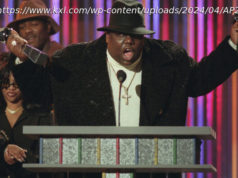Wayne Cochran, the rock ’n’ roll singer with the towering pompadour hairstyle who introduced “Goin’ Back to Miami” to the Blues Brothers, became a minister at Voice for Jesus Children Center and World Outreach near Miami Gardens. He died Tuesday at 78.
Wayne Cochran, the soul singer known for his outlandish outfits and platinum pompadour who came to be called The White Knight of Soul and who chucked it all to become a Miami minister, died Tuesday, his grandson Christopher Cochran said.
Cochran was 78.
His towering pompadour hairstyle, which got more attention than President Donald Trump’s hair before social media memes were a thing, was arguably more famous than his songs — and the songs he recorded with his band, the C. Riders, were plenty famous.
The Blues Brothers touted Cochran in the duo’s classic 1980 musical comedy film and recorded his signature ode to his adopted hometown, “Goin’ Back to Miami.” Pearl Jam covered “Last Kiss.” Rod Stewart was a fan of the singer of rockabilly and a sound that would come to be called blue-eyed soul.
And Elvis Presley borrowed elements of Cochran’s revue from the Las Vegas stage they both shared in the 1960s, as well as his rockabilly sound. When Presley sang Ma Rainey’s 12-bar blues song, “See See Rider,” in Vegas and for his 1973 TV special and album, “Aloha From Hawaii via Satellite,” the 1920s song also came to be known as “C. C. Rider.” Presley’s homage to his pal was obvious.
That towering pompadour eventually tamed to a manageable silver white. The outfits became respectable jackets. But the throaty, commanding voice that fronted Wayne Cochran and the C. Riders and more than held its own with Presley’s, remained. Cochran just found another audience.
The church.
After breaking up C. Rider in the 1970s, the Thomaston, Georgia-born Cochran started the Voice for Jesus Children Center and World Outreach storefront church near Miami Gardens in a row of warehouses along the Palmetto Expressway and Northwest 167th Street.
He had tasted the heights of rock ’n’ roll success, the “life in the fast lane” lifestyle the Eagles once embedded in pop culture from within a North Miami recording studio not far from where he’d set up his church. Too many drugs. Too many women. Too much partying.
“About 10 years ago, I had a gun to my head,” Cochran told the Miami Herald in 1983. The excesses, which led to divorces and near suicide, were no longer enticing. “I decided to take it one day at a time and try to find the answer,” he said.
The quest took some strange detours. Rolling Stone magazine once called him “Rock-and-roll’s first Egyptologist” because he went seeking the power of the pyramids — a trend in the decade that gave us the Pet Rock and disco.
“I needed something that would work. I didn’t need to hear about heaven. I needed to know about tonight, baby,” he told the Herald in 1983. All the “occults,” as he called them, quoted the Bible. Cochran figured he’d turn to the Scriptures, too.
The Word captured the wild man.
Cochran would use the power of popular music for the rest of his life through his active ministry in Northwest Miami-Dade.
“We’re not typical of a church,” he told the Herald. “We’re loud. It burns. I believe in the power of music. If you don’t want to get ecstatic, don’t come to this church. There ain’t no tombstones sitting in there and if they are, we’re gonna resurrect them. We have a good time. We boogie.”
Of course, he did.
From Cochran to Neil Diamond to Bruce Springsteen, rock ’n’ rollers know that commanding an arena full of faithful fans has the same allure as leading a flock of faithful believers.
As a teenager in Georgia, Cochran heard the black music that captivated white kids and was bitten. “I never heard race in the music. It was just music that spoke to me. It moved me,” he told the Herald in 2011. He moved to Macon, Georgia, where he struck up a friendship with the late soul singer Otis Redding. In 1960, he played bass with Redding’s band on the single, “Shout Bamalama.”
In 1964, Cochran was in Miami and took a gig as house band of a club that opened on the 79th Street Causeway. There, at The Barn, Cochran’s borrowed sound became his own.
He also knew that no one was watching the band when they were dancing, and Cochran’s music was eminently danceable. So he developed a performing style that would later serve him as a pastor.
“I would go out on the dance floor and the horn players would follow me. I’d drop down on my knees and they’d form a circle around me. Then everybody would stop dancing and start watching, and we just kept doing that until we became a show band, where people sat down or stood at the dance floor and just watched us,” he told the Miami New Times in 1997.
Cochran’s flamboyant style drew the famous through its doors to hear the C. Riders.
One of these stars, Jackie Gleason, who was filming his CBS show at the Miami Beach Convention Center, was reluctant to book local talent because hopefuls would clamor to get on his program and overwhelm producers with pleas.
Cochran was something else, though.
On “The Jackie Gleason Show,” Cochan introduced “Goin’ Back to Miami” to a national audience. Performances on other mid-1960s TV shows grew the song’s audience. A young Dan Aykroyd and John Belushi took notice and, as the Blues Brothers, introduced the song to an ’80s audience. Cochran and the C. Riders took over Vegas and opened for a commercially revived Presley.
Back in South Florida, Cochran also discovered a young bass player in Oakland Park who approached him looking to join the C. Riders in the early 1970s. “He made sounds on his instrument I had never heard before,” Cochran told the Herald in 2011 about Jaco Pastorius, the preternaturally gifted bassist who became one of the most distinctive musicians jazz has ever known. Pastorius would go on to back Joni Mitchell during her jazz phase in the late 1970s. Pastorius, who lived hard, was killed at 35 after a confrontation with a Wilton Manors bouncer in 1987.
By then, the Rev. Cochran was clean for more than a decade and entrenched in his Miami Gardens-area church, which, at one point, spiritually adopted 800 families who were living in the Annie M. Coleman Gardens Housing Project in Liberty City.






